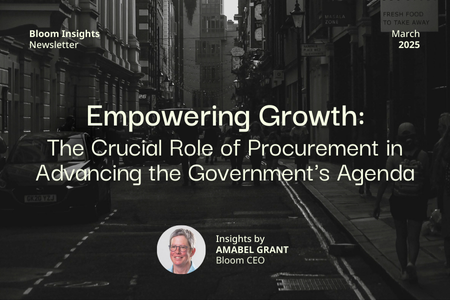How the UK Transformation Fund Helps Public Sector Innovation
The UK Government’s Spring Statement has delivered something we have long called for: a clear mandate for public sector innovation backed by meaningful investment. The announcement of a £3.25 billion Transformation Fund is a clear call to reform how services are delivered. By providing a £42 million budget allocation to AI-led pilots, too, the intent is unmistakable. We no longer discuss the need for transformation; we are being challenged to deliver it.
Investment alone doesn’t deliver successful change, of course. Success is defined by the hard work and smart thinking between vision and execution. This is precisely where public procurement must evolve. The status quo will not deliver the Transformation Fund’s stated goals or drive benefits from adopting AI.
At Bloom, we’ve long advocated for more intelligent, more agile public sector procurement. We know the value of being able to start working with innovative suppliers quickly and with confidence. With an ambitious road to the technological revolution mapped out ahead, this has indeed never been in sharper focus.
A New Opportunity for Smarter Public Services
Calling for radical reform is not a new concept in government. However, for the first time in many years, there is an alignment of funding, political will, and emerging technologies that could make large-scale digital transformation happen.
Artificial Intelligence and automation are no longer speculative tools — they’re already reshaping how services can be delivered. Technology’s crucial role is not replacing public sector professionals, but empowering them to eliminate inefficiencies, reduce administrative burdens, and create space for strategic, citizen-focused initiatives.
Public bodies across the UK now face a decisive moment: rethinking how services are delivered and ensuring the right suppliers are in place to make them happen.
What the £3.25bn Transformation Fund Means in Practice
The Chancellor has been clear: this fund is designed to support “fundamental reform” of public services. Reeve was in no mood to explore marginal gains. She discussed investment in terms of bold paradigm-shifting projects. Digitising local council legacy systems, reducing Whitehall overheads or using big data in healthcare are all, it seems, potential targets.
What all these opportunities have in common is the need for specialist, innovative, responsive and creative suppliers. Often, these will be SMEs — highly skilled, innovation-led firms that bring fresh thinking and agile delivery. As it stands, frustratingly, many of these suppliers sit outside traditional procurement ecosystems, which are currently dominated by their bigger, more established counterparts.
Delivering a return on the Transformation Fund investment depends on helping buyers swap out some of the old guard for new, ambitious, and agile delivery partners. For this to happen, procurement practices are going to have to evolve.
How DSIT A.I. Exemplars Could Improve Government Delivery
In parallel with the UK Transformation Fund, the Department for Science, Innovation and Technology (DSIT) has launched three Frontier AI Exemplars projects. These will be real-world pilots testing how artificial intelligence can streamline internal processes, reduce red tape, and improve operational efficiency. These pilots are not intended to be theoretical. They are about cutting through the bureaucracy that slows decision-making and frustrates civil servants and citizens alike.
As the AI in government service exemplars progress, they will create new procurement needs for specialist developers, data engineers, platform integrators, and digital service designers. Many of these capabilities won’t reside with legacy providers, but instead with newer, more agile suppliers. The DSIT AI programmes challenge public sector buyers, asking them to find new ways of engaging with the right specialist businesses.
Connecting Buyers with the Right Suppliers
So, the issue is not solely innovation. We need to look at the attitude of those tasked with finding suppliers. Their traditional view of procurement still dominates, prioritising assurance. However, today’s buyers often struggle with pace and flexibility. Meanwhile, innovative SMEs — particularly those at the cutting edge of AI and automation — find public sector entry points opaque, overly complex and too onerous to spend time on.
We have the policy, the suppliers, and now the money. What’s missing? The intelligent, responsive procurement mechanism we need to move forward.
How Bloom Supports Faster, More Innovative Procurement
The good news is Bloom specialises in providing modern, quick and agile procurement - exactly what the UK Government’s Transformational Fund calls for.
Through a range of products and services, including our NEPRO³ framework, we operate as a neutral vendor. We provide a pre-approved supplier ecosystem that enables public sector buyers to source and onboard pre-approved specialist suppliers quickly via a streamlined and competitive procurement route without compromising compliance. Our platform offers change-hungry public sector buyers access to a curated marketplace of specialist SMEs, many of whom bring exactly the capabilities the government is now prioritising—from machine learning to systems integration to user-centred service design.
We also provide wraparound support, vital in today’s increasingly complex world. From initial market engagement to performance management, we help public sector teams act decisively while reducing administrative overheads and ensuring competitive pricing as they reform their operations and innovate their solutions, all while staying within procurement rules and governance frameworks.
Across all sectors, similar patterns are emerging. Alongside the civil service, NHS and local government, the Ministry of Defence has been tasked with accelerating innovation through improved purchasing processes, and a recent Public Accounts Committee hearing called for systematic barriers within central government to be overcome. Public sector leaders want to move faster with funding now in place. Creative, problem-solving suppliers stand ready to act. The challenge? Procurement processes have to catch up and match this newfound momentum. At Bloom, we take pride in being part of that solution, enabling a more agile procurement approach that balances cost-effectiveness with the necessity for timely delivery.
A Future of Digital Transformation In Public Services
The £3.25 billion reform fund and AI exemplar projects mark more than a budget announcement. For those interested in public sector reform, they mark a genuinely exciting moment of strategic intent. The challenge has been laid at our door: modernise public services, embrace new technology, and reap the rewards.
At Bloom, we see our role as providing public sector buyers access to a new generation of skilled, innovative suppliers. To do this, we cut through complexity, smoothly navigate the selection and onboarding of talent, and deliver ongoing performance management fit for a digital future.
The opportunity to revolutionise how we work has never been greater — and neither has the responsibility to act.


